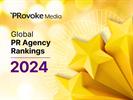Paul Holmes 12 Dec 2021 // 1:27PM GMT

Thought leadership is probably the most effective form of marketing for most professional service firms, so it’s no surprise that the PR industry produces a wealth of surveys and studies.
Excluding our own research, and emphasizing new initiatives or new findings over well-established pieces of intellectual property (particularly those that have made this list in previous years), we have selected the most important thought leadership studies of the past 12 months, as part of our ongoing 2021 Review.
It’s a top 10 list, but we’ve taken the liberty of grouping some studies together to capture the wide spectrum of research we saw over the course of the year.
1. Overcoming vaccine hesitancy
We all hoped that the Covid crisis would be less relevant in 2021 than it had been the previous year, when it dominated the thought leadership produced by the PR industry. But the Covid crisis continued, with fresh permutations, and the industry continued to provide insight—especially once vaccines became available and we began to realize that disinformation and ignorance could be as dangerous as the virus itself.
In February, W2O research found some cause for optimism, with an analysis of Twitter conversation finding that 80% of Americans were willing to be vaccinated. Though the survey also highlighted a major cause of concern: “It’s not about safety or efficiency. It’s that they essentially don’t want to be told what to do,” said chief data officer Seth Duncan, presaging resistance that would lead to far lower vaccination levels later in the year.
By June, a global study commissioned by media intelligence giant Carma International reported a clear link between trust in government and trust in the vaccine—at a time trust in governments around the world appeared to be irretrievably polarized.
Said company CEO Richard Bagnall: “"The report demonstrates that misinformation does not exist only in the dark corners of the digital social sphere, reaffirming that our leaders and all those we look up to have a critical part to play. How governments and their leadership behave, how they communicate, and how the media reports has a significant on public perception and behavior.”
2. Black lives still matter
Another theme that carried over from 2020—and needs to be sustained until real progress is made—is the corporate response to the Black Lives Matter movement
Research from data-driven public affairs firm Kivvit found that sports leagues and teams, universities and nonprofit organizations were the most active on issues of racial equity, while just 10% of the 150 most popular brands in the US and 13% of Fortune 500 companies chose to engage. The good news was that some relatively conservative brands such as Nordstrom were quick to involve themselves.
Brad Weekes, principal at Kivvit, pointed the way forward: “Brands need to recognize that whatever their business is or whatever customer they traditionally serve, racial and social equality is relevant to them and there is an imperative to speak out against injustice, not just when it’s trending, but as an ongoing part of their identity.”
3-5. The Great Resignation
The most significant new issue on the thought leadership radar was “the great resignation,” a global phenomenon that saw employees expressing reticence about a return to business-as-usual after the prolonged lockdown. Some enjoyed the autonomy that came from working at home and were reluctant to go back to the command-and-control environment of nine-to-five work, while others were simply disillusioned and disengaged by companies that underpaid and over-exploited their workers.
Zeno was among the first to identify a shift, warning in its report “A New Mindset at Work: The Evolving Workplace” that found that 48% of satisfied employees were open to new opportunities, with many actively searching for them. Mark Shadle, Zeno’s managing director of global corporate affairs, urged companies to focus on employees “who have been happy, but stuck. It's too easy to overlook them or forget about them. This is a big takeaway for companies today, especially now that there are labor shortages in many industries.”
A few months later BCW’s inaugural International Workforce Insights Study found that more than half of all employees say they feel more empowered to influence change in their workplace compared to a year ago, including relating to business strategy (54%), company culture (55%) and their experience of work (59%). This feeling of empowerment was most pronounced among Gen Z and Millennials.
And in a related development suggesting one way companies might try to counter employee flight, Edelman’s Trust Barometer (which shows up on this list with some regularity) found that more and more employees (61%) are now choosing what jobs they take based on personal beliefs, with the figure rising to 67% of those aged 18-34.
6. Fearless leadership
WE Communications’ Brands in Motion research (full disclosure: PRovoke Media partnered with the agency on the study's launch) has evolved over the past few years and in 2021 focused on the way in which some of the issues discussed above—from the pandemic to the Black Lives Matter movement—have changed, or at least accelerated the change in, public expectations of corporations and their CEOs.
Half of global consumers now expect chief executives to frequently go public with their personal opinions, a number that rises still further when parameters are added. 70% of consumers support CEOs sharing their opinions with at least one of five audiences—employees, customers, shareholders, social media and the media — from “almost constantly” to every three months.
An analysis piece looked at the ramifications, advising CEOs—and their communicators—to “get comfortable with being uncomfortable.” Said WE Australia and Singapore EVP Rebecca Wilson. "There is both an opportunity and expectation for brands to step in and provide the leadership and moral compass to navigate our current environment."
7-9. Asia’s changing expectations
After a year of Covid, Asian consumers are putting a premium on companies’ brand purpose. For 77% of respondents to a Zeno study, brand purpose has become more important over the last 12 months. That number was highest in India (88%), China (83%) and Malaysia (80%). The survey found consumers are 7.9 times more likely to buy a brand based on purpose than they were a year ago, 9.1 times more likely to trust the brand, and 9.8 times more likely to recommend the brand to friends and family. And they placed the highest emphasis on treating all employees well, regardless of rank or level (55%); having ethical business practices (55%); and having sustainable business practices (51%).
In Singapore, meanwhile, Gen Z is growing up with considerable skepticism about corporations and brands, according to a study by DeVries Global, which found Gen Z hyper-aware and distrustful of online information, with a whopping 96% of respondents saying they ‘are willing to pay a premium for brands they deem transparent’. But they warn against over-promising, and that when companies do not live up to their communications, consumers “may just think it is an advertising strategy”.
Expectations are high, in other words, and companies are not living up to them, according to a separate study from FleishmanHillard, part of its continuing Authenticity Gap series. Chinese consumers say companies aren’t delivering on promises to act on important societal issues. The environment and climate change are top of mind for many consumers, 39% of whom expect companies in China to do or say something about those issues.
10. Behave yourselves
And finally, a timely reminder that actions speak louder than words, that what companies do matters more than what they say (and the PR people must make sure companies have the right policies, and not just the best communications) came from European consultancy BoldT, which published its first ESG report at the beginning of the year and found that while business ethics featured as a key reputation risk, sentiment had plummeted during 2020 to become significantly more negative than all other reputation factors.
According to the report, “Business ethics shifted during 2020 from being a sizeable, but often intangible, risk to being the number one, with a sharp fall in sentiment surrounding it across practically every sector. It will always represent different risks to different companies, but the need to address is as a reputation priority is stark.”



































.jpg)






























